Meet Susan Hurley, Senior Music Therapist at Children's Health Ireland
An interview with Susan Hurley, Senior Music Therapist in Children’s Health Ireland.
Tell me about your role within Children’s Health Ireland hospitals – why is music therapy important for sick children?
I am a senior music therapist in Children’s Health Ireland. Music Therapists are trained to work with all people using music as a tool to achieve health goals. One of the reasons that it is available for sick children is to help support them through their hospital journey. Music is unique in that everyone responds to it. From the womb we are listening to our mother’s heartbeat. Even the tiniest of premature babies responds to music and it helps to soothe and relax them. It can also bring a lot of positive emotion, a lot of fun, joy and mastery and it builds self-esteem. By using different instruments and sounds we help children express themselves, help them communicate and find ways to engage in something meaningful.

What does a typical music therapy session involve?
It varies based on the age, preferences and needs of the child. The child does not need any experience playing or doing music lessons. A typical session for an infant might be focused on regulation, helping soothe them, using soft sounds with voice, simple sounds, lullabies and nursery rhymes. A session with an older child might be more focused giving a sense of mastery and control, and active music-making, using familiar songs that they like. That could involve singing, playing,
improvisation. A session with a teenager could be really different again – it could involve verbal processing and expressing emotion, it could be song-writing or learning an instrument to help build their self-esteem and give them an outlet to process the challenging things they are going through.
What are some rewarding and challenging aspects of your role?
Music is seen as a positive, fun and normal part of life that is really welcomed. So we get to make a special bond with children and their parents, help support them, and take them away from the hustle, bustle and stress of the hospital and bring them into a whole new environment – there is great job satisfaction in that. One of the challenges is we are still a small service so we are always trying our best to meet the needs of the hospital and the patients. But the rewarding aspect is that we are one of the teams that the patients love to see come into the room.
Is there a particular patient story that stands out in your memory?
I had a young patient who was in hospital for a long time and was becoming increasingly fearful of all medical staff coming into the room. I built a relationship with him by using non-directive music therapy techniques where he felt in charge. He could tell me no, he could tell me what he wanted, play all his favourite songs, all his favourite instruments. We built up this relationship where I could help soothe him when he became upset. When he needed to go to theatre I would meet him beforehand and have a quick 15-20-minute session to help keep him regulated and engaged, focused on the positive.
What is the impact of the kind people who support Children’s Health Foundation on your work?
A huge impact! My post was developed from donations to Children’s Health Foundation. There was originally only one music therapist working here one day a week. My post started off as a two-days-a-week temporary role which was funded by Children’s Health Foundation’s kind supporters up until recently. Last year I was delighted when I was made permanent and a full-time role. So that funding sparked off so much, it has led to a really significant increase in the amount of music therapy in the hospital. It genuinely makes a massive difference every day.
